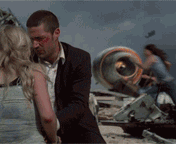
Remarks Delivered by CIA Director John Brennan at the OSS Society Awards Dinner
Remarks by Central Intelligence Agency Director John O. Brennan as prepared for delivery at the OSS Society Donovan Award Dinner in Honor of William McRaven
October 26, 2013
Good evening. Thank you, Ambassador Montgomery, for that introduction and for your many decades of distinguished service to our Nation. I am deeply honored to be here tonight to salute this year’s recipient of the William J. Donovan Award, Admiral Bill McRaven. This is a particular privilege for me because Admiral McRaven is not only a most deserving honoree—he is also a fellow Longhorn from the University of Texas, and a good friend.
Before I begin, let me say how flattered I am to share the stage this evening with such an outstanding group of public servants. And of course it is a thrill to stand before the many eminent guests in the audience who have also served our Nation with great distinction over the years.
Well tonight marks a truly wonderful occasion. We come together to celebrate not only an exceptional American but also a very special organization, the OSS, which as you all know was a forerunner of both the CIA and the US Special Operations Command.
After the OSS was dissolved in 1945, intelligence and special operations diverged, each taking a separate path that occasionally overlapped with the other but that more often moved forward independent of the other. But recent history has reversed that divergence, as this Nation’s response to the attacks of 9/11 brought the two main branches of the OSS back together. Intelligence officers and special operators are once again working hand-in-hand to take the fight to our adversaries.
This makes the history of the OSS more relevant than ever to the women and men charged with protecting our Nation. And it is one of the reasons that we are so indebted to the organizer of this evening’s ceremony, Charles Pinck [President of the OSS Society]. Charles has done yeoman’s work in preserving the memory of the OSS and in educating the American people about its vital contributions to our Nation’s security. Even more importantly, Charles has reminded us that the story of the OSS is much more than a fascinating tale from decades past. It is also a trove of lessons for the present and the future, one that all of us in the national security professions would do well to study.
For me, a central lesson of the OSS can be found in its very makeup. The OSS recruited from all backgrounds and every walk of life. It reached into academia, journalism, Wall Street, the arts, and, of course, the military. And it prized officers with a range of skills rather than star performers in a single pursuit. Intellect alone was not enough, nor was physical prowess. The OSS wanted a blend of the two. As one observer memorably put it, the perfect recruit was a “Ph.D who can win a bar fight.”
At CIA, we value people who stand out for the very same reasons—minus the bar fights. We know that solving intelligence problems means bringing to bear a variety of viewpoints and skills, and that is a philosophy we can trace directly to the wonderful assortment of personalities in the OSS, the group that Wild Bill Donovan lovingly called his “glorious amateurs.”
Another crucial lesson passed down to us by the OSS is that successful organizations must be willing to take risks. For OSS officers, mistakes were not the enemy. Mistakes were the natural byproduct of bold and decisive action, a signal that you were stretching yourself to the limit. An officer who never faltered was an officer with a bias for caution. And what the OSS needed was precisely the opposite: intrepid spirits who loved to experiment, improvise, and roll the dice.
William Casey, one of my distinguished predecessors in the Director’s office at CIA, described his service in the OSS this way: “You didn’t wait six months for a feasibility study to prove that an idea could work. You gambled that it might work.”
Risk taking is essential to good intelligence, and no one knows that better than the OSS veterans who are with us tonight. Through your courage and enterprise, you showed what rewards there are in breaking free from convention and taking a shot at something new, even when the odds are stacked against you. In doing so, you established a tradition of risk taking that continues to guide intelligence officers and special operators to this very day.
For this and for so much more, CIA owes you a tremendous debt of gratitude. And so tonight, I would like to take the opportunity to tell you directly just how much I appreciate your extraordinary service. Your contributions to our Agency, and to our Nation, have been immeasurable. And it is my great privilege to say thank you. [Applaud]
It is hard to think of a more worthy heir to the legacy of the OSS than the man we honor tonight: Admiral William Harry McRaven. He may not have a Ph.D, but he is blessed with a razor-sharp mind, and I think we all recognize that he could handle himself pretty well in a bar fight.
And he understands—as well as anyone I know—the importance of taking risks. In his line of work, there is no such thing as a sure thing. Risk is a fact of life in special operations, but with an added and very serious twist. If things break the other way, lives are lost.
Yet, despite the high stakes, Admiral McRaven has never allowed himself to play it safe. In looking back over his career, he once made the following observation: “One thing I have learned over time is that you have to learn to fail. It is a natural course in combat that we will make mistakes….If you internalize that too much or let that burden become so large, then as a leader you can’t make the next right decision.”
As many here can attest, making the right decision is something that has always come naturally to Admiral McRaven. Well, almost always.
I think it is fair to say that he made a few false steps early on. Like many of us, it took Bill a while to figure out what he wanted to do with his life.
Here is how he recounted his first semesters at the University of Texas. The direct, unsparingly honest descriptions are vintage McRaven: “I started off in pre-med. Did not do well there. Then I went to business. Oh, I was worse in business.”
As he meandered through his undergraduate years, he dabbled in an array of subjects. In fact, I am pretty sure that Admiral McRaven is the only special operations commander who thought seriously about becoming an accountant.
But accounting was not his thing either. So Admiral McRaven, in a sign of the infinite wisdom and foresight that we have come to know him by, decided to enter a field with an ironclad future: newspapers.
In the end, Admiral Mcraven opted for a career that was a little less stressful than all of those, choosing a life of comfort and ease that can only be found in the Navy SEALs.
And it is a good thing for all of us—and for Americans everywhere—that he did. For there can be no question that our country is safer today because of the service of Admiral McRaven. He has been one of the bedrock figures of our Nation’s response to 9/11.
Now I know that he would resist that description. The fight against al Qa‘ida and its allies, he would say, has involved all instruments of national power, and no single person or organization deserves special acclaim. And in a way he would be right. Dedicated Americans from organizations across the government have made major contributions to the effort.
But it is also true that in some respects this has been the age of the “silent warrior”—or to use Admiral McRaven’s term, the “quiet professionals” who operate under his command.
Over the past dozen years, our special operators have taken a somewhat counterintuitive idea and proved its worth beyond any reasonable doubt—the idea that small, agile forces can gain decisive advantage over larger ones and help turn the tide of broad conflicts.
And as much as anyone, Admiral McRaven has been the driving force behind this achievement. He was both the thinker who helped promote the idea, and the warrior who helped carry it out.
As a graduate student in the early 1990s, Admiral McRaven wrote a thesis that explained how effective special operations are conducted. In a masterful display of clear and concise writing, he used fourteen words to describe what special operators must have to succeed: “a simple plan, carefully concealed, realistically rehearsed and executed with surprise, speed and purpose."
Of course, it took him another 600 pages to fully explain what he meant. Some ideas are so complex they defy even Admiral McRaven’s gifts for brevity.
Drawing on the ideas in his thesis, he later helped advocate an approach to combating terrorism that has been a cornerstone of our campaigns of the past 12 years—the notion that to effectively counter the terrorist threat, you must take the fight to the enemy.
These and many other ideas that have influenced the post-9/11 era bear the stamp of Admiral McRaven. And in the long, hard fight since those terrible attacks, the merits of his ideas—as well as the merits of US special operations forces as a whole—have been more than borne out.
The ultimate proof of this, of course, came in May 2011, during the raid that brought justice to Usama bin Ladin.
Much has been said about that operation, and many factors account for its success. It was the result of years of painstaking work by people across the government, including, of course, the outstanding women and men I am privileged to lead at CIA.
But we were not aboard those helicopters that night as they lifted off for Abbottabad. Nor did we command the men who were. Though many people helped prepare for the raid, there was only one person directing it once President Obama gave the order to proceed. And that was Admiral McRaven.
Ever humble, he will tell you that his contribution was minor. He will stress that the operation itself was less of an achievement than the intelligence and policy work that led up to it. In fact, when asked to describe the operation, he once chose an adjective that demonstrates both his modesty and his keen talent for understatement. He called it…“sporty.”
As anyone who was privy to the details of the mission can tell you, this was a dangerous and exceedingly complex operation. The deliberations over whether to undertake it were difficult and fraught with uncertainty.
But as Vice President Biden has said, there was a key moment in those deliberations—a moment when President Obama seemed to move a step closer to his final decision. It was when Admiral McRaven looked at the President and said: “Sir, we can get this job done.”
What made that such an important moment was not just the meaning of those words, but the integrity of the man who said them. Everyone in that room, from the President on down, had enormous faith in Admiral McRaven. Our trust in him was bone deep.
He had built that trust over time, by virtue of his intellect, his sincerity, his character, his ingenuity, his resolve, his composure, and his sheer common sense.
Those of you who know Admiral McRaven personally would surely affirm that he has all those qualities and more. He is the consummate man of arms.
And if we are going to make this an honest tribute, there is one more thing that must be said. Admiral McRaven is as decent a person as you will ever come across, not just a hero but a full-on good guy.
I am honored to call him a colleague and a friend. And I am deeply grateful for the opportunity on behalf of the women and men of the CIA to introduce to all of you tonight one of this nation’s finest patriots, Admiral William Harry McCraven.
Admiral McRaven, on behalf of the women and men of CIA, thank you and congratulations.
Posted: Nov 21, 2013 12:30 PM
Last Updated: Nov 21, 2013 12:46 PM









































































































